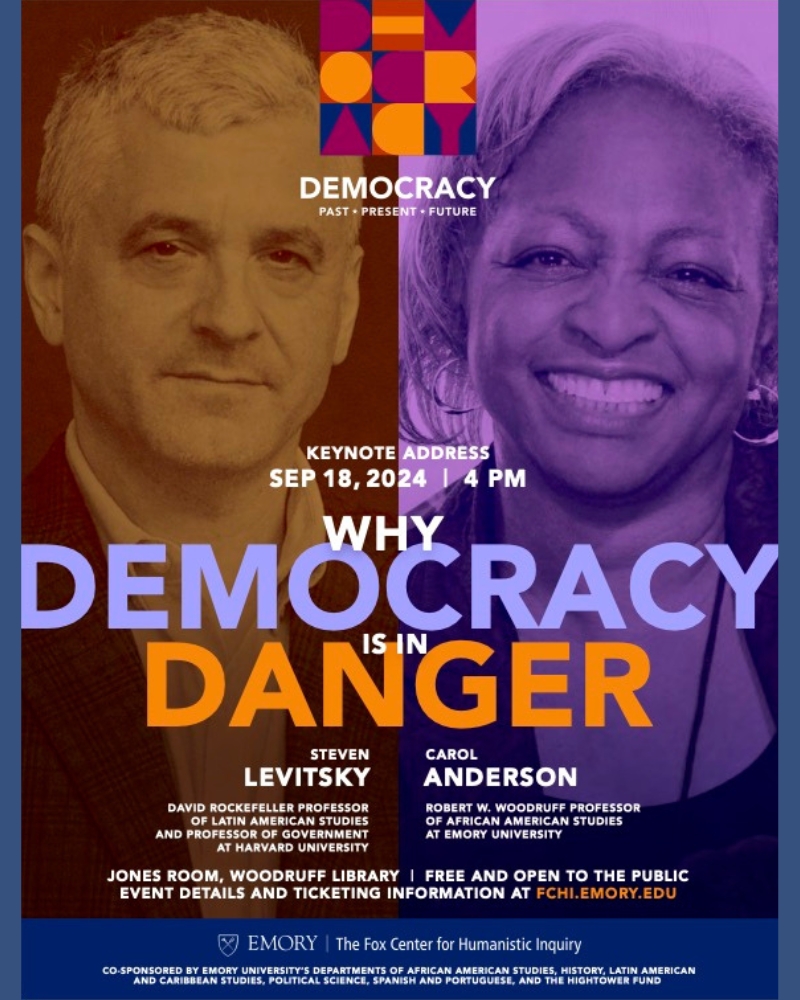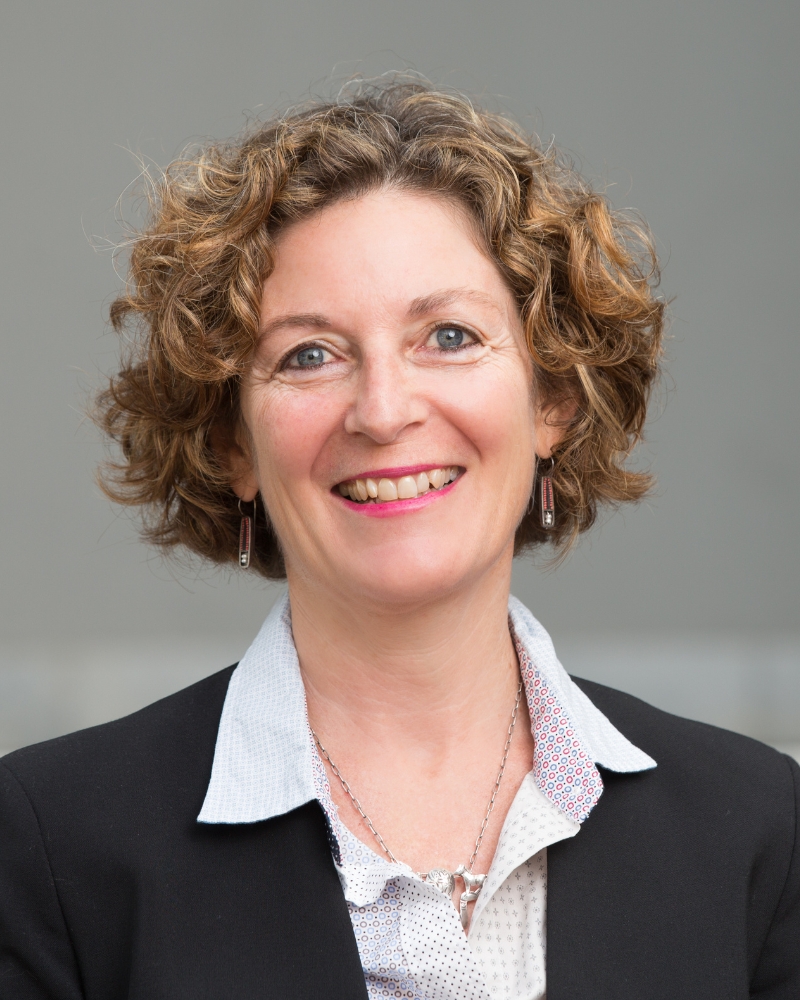How did we get here?
It’s a — perhaps the — question reverberating across the nation: what are the stakes for American democracy and how will the upcoming presidential election shape the future of the United States and the wider world?
Thanks to the Fox Center for Humanistic Inquiry, the community can contemplate this topic together over the next year, benefiting from the insights of Emory faculty scholars and outside experts. The exploration of “Democracy: Past, Present, Future” will kick off with a keynote address featuring historian Steven Levitsky, who co-authored — with Daniel Ziblatt — two recent and influential studies, “Tyranny of the Minority” (2023) and “How Democracies Die” (2019).
Confronting what imperils democracy
Serving as the David Rockefeller Professor of Latin American Studies and professor of government at Harvard University, Levitsky is a national voice on democratization, authoritarianism and political parties. He will join forces with Emory’s Carol Anderson, Robert W. Woodruff Professor of African American Studies and author of “One Person, No Vote: How Voter Suppression Is Destroying Our Democracy,” on Wednesday, Sept. 18, at 4 p.m. for the lecture and discussion “Why Democracy Is in Danger.”

Emory is uniquely poised to convene this consequential conversation. In Feb. 2023, the Mellon Foundation awarded the university a multiyear, $526,000 grant to create a center — known as the Imagining Democracy Lab — that advances civic engagement and democratic participation between Emory and community organizations based in and around Atlanta.
Anderson and Bernard Fraga — associate professor of political science and a specialist in race, elections and voter behavior — lead the lab. Fraga is the author of “The Turnout Gap: Race, Ethnicity and Political Inequality in a Diversifying America” (2018), which — among its key findings — demonstrates that elections are increasingly unrepresentative of the wishes of all Americans.
As she looks forward to her discussion with Levitsky, Anderson observes: “It’s appropriate that we are having the conversation in the Deep South where, during Jim Crow, democracy withered so badly that the Nazis came to the U.S. to take notes. The South’s electoral, judicial and educational assaults were unrelenting. But so was the will to be free. Democracy began to revive because of mass civic engagement. We know how to meet the challenge to democracy.”
As Emory’s hub for the humanities, the Fox Center will be a fitting host for these discussions. As its website attests, “Democracy is measured, on one hand, by the state of political institutions and governance practices: policies, elections, legal apparatus and judicial mechanisms. At the same time, art, education and public cultures provide spaces where democratic belonging and freedom are actively and creatively shaped. … Humanities research and creative works also play a critical role in analyzing and advancing democratic ideals and institutions.”
October panel discussion to delve further
Following the September keynote, the Fox Center will host a second event on Wednesday, Oct. 23, at 6 p.m. in The Michael C. Carlos Museum’s Ackerman Hall with The Guardian. The Guardian has a dedicated democracy team in the U.S. that reports on elections, voting rights and threats to democratic institutions and individual rights. The paper has hosted similar live events on democracy, including one at the University of Chicago.
The Oct. 23 event will be a panel discussion — “The Fight to Vote: The Past, Present and Future of Voting Rights in America” — on the historic threats to democracy featuring Anderson and Alan Abramowitz, Alben W. Barkley Professor Emeritus in the Department of Political Science. They will discuss voter suppression and race as an undergirding element to oppression. Guardian reporters Sam Levine and George Chidi will participate in the panel discussion, and a fireside chat will follow.
“We are incredibly proud to partner with the Fox Center for Humanistic Inquiry, Imagining Democracy Lab and Professor Anderson, who has been a trusted advisor and contributor to the Guardian’s voting rights coverage,” says Kira Lerner, democracy editor for Guardian U.S. “At this critical moment, engaging audiences in meaningful conversations about the risks we face as well as the response to them is more important than ever.”
Annual themes and key words: new directions at the Fox Center
The 2024-25 academic year marks the first that the Fox Center will be guided by a central organizing theme. It is one of a number of new initiatives launched since Carla Freeman took over as director in 2023. Freeman spent last fall interviewing other directors and visiting some of the most vibrant humanities centers across the country, seeking inspiration and new models to enhance the scope and impact of the center’s work.

Carla Freeman, director of the Fox Center for Humanistic Inquiry
“By exploring different fellowship models and programming initiatives, we aim to become an even more dynamic space for intellectual engagement, experimentation and collaboration. Among our faculty, there was a lot of interest in introducing a thematic approach, and democracy emerged organically this year. As the thread connecting all of the residential Fox fellows interrogating the comparative histories of democracy in this pivotal election year, the theme offers us a perfect opportunity to engage the wider campus and to highlight the urgency and vibrancy of humanistic inquiry,” says Freeman.
Assessing democracy through many lenses
In selecting this year’s fellows, “we found especially compelling those whose research interests are resonant with a panoramic view of democracy — from nationalist political movements to a range of expressive musical and poetic forms of protest. We welcomed projects investigating democracy across international contexts and time periods and were eager to support interdisciplinary approaches employing a range of methodologies and approaches, including public and digital humanities,” Freeman indicates.
As the applications flowed in from external postdocs, along with Emory faculty, graduate and undergraduate fellows, it was clear that the democracy theme had sparked additional interest. “We got a superlative pool of candidates and were thrilled to hear that, for our postdoctoral fellows, the alignment of the democracy theme led them to choose Emory over other opportunities,” notes Freeman.
As part of the newly expanded fellows program, the Fox Center will now welcome two Atlanta-area scholars: Timothy Barouch will join as a visiting Democracy Fellow from Georgia State University, along with Verónica Zebadúa-Yáñez from Spelman College.
Of the Emory faculty fellows, three are from Emory College of Arts and Sciences and one from Candler School of Theology.
Aisha Finch, associate professor and director of graduate studies for the Department of Women’s, Gender and Sexuality Studies, is joining the center this year and observes: “Black feminist scholars and racial justice activists in Latin America have long been engaged in reimagining the possibilities, parameters and practices of democracy. My work considers the ways they have turned to the historical example of cimarronaje (marronage) — or escape from slavery — to rethink the possibilities of civic and political life.”
She adds, “In so doing, they have revised the terms of democracy itself, aligning their democratic visions with the kind of freedom that enslaved people forged through an audacious refusal of the logic of plantation slavery and racial capitalism.”
Michael Allen is joining as the NEH Postdoctoral Fellow in Poetics, having recently completed his doctoral studies at Harvard University. While in residence, Allen will pursue two projects.
The first one asks how British poets after World War II dealt with the rise of American cultural power. As these poets came of age, Britain shifted from the center of a global empire to a small democratic country on the edge of Europe. “In this period,” says Allen, “we can see British poets questioning whether they should adopt literary forms, popular music, historical narratives and more from the large and powerful English-speaking democracy across the Atlantic.”
His second project asks how American poets participated in democratic debates over “urban renewal” in postwar America. “As architects, politicians and social activists argued over whether to save neighborhoods or bulldoze them, poets reflected these points of view in works that cherished or demolished established literary forms,” Allen says. Research for both endeavors will find him “plunging into the incredible richness of the Raymond Danowski Poetry Library,” part of the holdings of the Stuart A. Rose Manuscript, Archives, and Rare Book Library.
Allen considers the center’s democracy theme “urgent” and adds: “Democracy is more than a mechanism for selecting leaders, as we can see from how often that mechanism threatens to break down. Democratic institutions can only thrive in a democratic culture, a culture of shared participation in an unfinished and unfinishable project.”
In the spring, each of the postdoctoral fellows will have an opportunity to invite a senior scholar to campus for public talks and as “key interlocutors to engage with their own work,” says Freeman.
A year brimming with ideas and events
Two other new programs launched by the Fox Center will spotlight the scholarship and creative work of Emory faculty. The center will sponsor and co-host book launch celebrations for faculty authors across humanistic fields, with five such celebrations already scheduled for 2024-25. And a new podcast series, hosted by the Fox Center’s associate director Mae Velloso-Lyons, will air in concert with the fellows’ emerging research and faculty book launches.
Called “the year of elections,” 2024 is when half the world will vote and shape the political profile of their nations and the geopolitical climate at large.
“My hope is that that the Emory community will engage in a number of new ways with the Fox Center and that together we will help humanistic inquiry flourish. By examining democracy together not only as an important subject for comparative and historical analysis — but also as a matter of political urgency in real time — we hope to foster stimulating debate and dialogue. The insights generated over the course of this year should contribute to the national conversation and to the intellectual culture and civic engagement of our campus, and I am excited about centering our activities in this way,” Freeman concludes.
Fall semester Fox Center democracy conversations
“Why Democracy Is in Danger”
Keynote address by Carol Anderson and Steven Levitsky
Wednesday, Sept. 18, at 4 p.m.
Robert W. Woodruff Library, Jones Room
The event will be livestreamed and recorded (register to join the livestream). It is cosponsored by Emory’s departments of African American studies, history, Latin American and Caribbean studies, political science, Spanish and Portuguese, and the Hightower Fund.
“The Fight to Vote: The Past, Present and Future of Voting Rights in America”
Panel discussion featuring Carol Anderson, Alan Abramowitz and Guardian reporters Kia Lerner, Sam Levine and George Chidi
Wednesday, Oct. 23, at 6 p.m.
Michael C. Carlos Museum, Ackerman Hall

